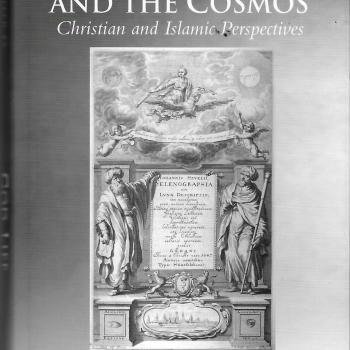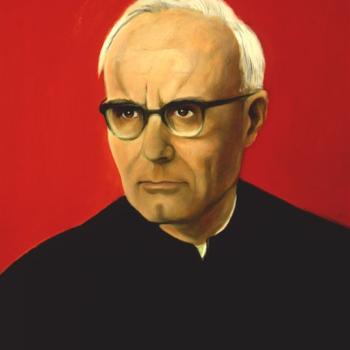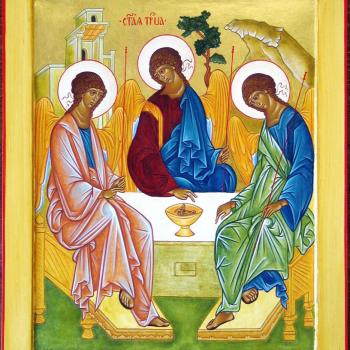Does God Exist?
 When we ask—“does God exist?”—we are also asking whether your or my personal life really matters. It is not like asking whether extraterrestrial aliens exist. Or whether Sasquatch exists. No. To ask—“does God exist?”—is to ask whether your or my personhood has ultimate meaning. Whether we are eternal. Whether there is purpose in our daily living.
When we ask—“does God exist?”—we are also asking whether your or my personal life really matters. It is not like asking whether extraterrestrial aliens exist. Or whether Sasquatch exists. No. To ask—“does God exist?”—is to ask whether your or my personhood has ultimate meaning. Whether we are eternal. Whether there is purpose in our daily living.
On the one hand, our word God refers to the creator and redeemer of the cosmos, of all that is or ever will be. On the other hand, the same word, God, refers to what lies deepest within us. It refers to our essence, to who we truly are.
When we look deeply within ourselves, we may not see anything other than an infinite abyss. Who we are is slung between the image our friends project onto us and the shapeless nothingness we find inside. Many a dark night of the soul—tossing and flailing in bed—is occupied with plummeting the darkness and finding no bottom. We painfully push the KMS thoughts out of our head.
Who God is matters here. A college student at a Jesuit university, Christine Lenahan, reports she found “God in both the grand and the granular.” My terms for this are ‘beyond” and “intimate.”
To speak of God is to connect the existence of the whole universe with the existence of your or my inner soul. Anything less is simply not God.
Teenagers ask the question: does God exist?
James Martin S.J., an editor at America magazine, is aware that church pews seat relatively few young people.
“Many young people don’t think about God and don’t pay attention to religion. And when they do pay attention it’s to say how terrible religious people are: narrow-minded, misogynistic, homophobic and so on.”
Perhaps when teenagers ask the question — does God exist? — they answer quickly: no. Or, they answer: who cares whether God exists or not?
Atheists care. That’s why they fight about it.
Some atheists just don’t understand the assignment!

Sometimes our online atheist friends miss the point about theism. They challenge us to prove the existence of a god or gods. They imagine theists are worshipping Zeus or Ganesha or the earth-mother goddess. But, say atheists, all these gods and goddesses are fictions of our imagination.
“In an atheistic world view, gods are fictional creations,” says The Atheist Bible. Nobody wants to worship a fiction. We thirst for reality, true reality.
Author of The God Delusion, Richard Dawkins, says with considerable pomposity that he is not attacking any specific divine figure such as Yahweh, Jesus, Allah, Baal, Zeus, or Wotan. Rather, he is attacking all of them at once. All belief in such divinities can be swept up into a single “God Hypothesis,” which Dawkins attempts to falsify.
“I shall define the God Hypothesis more defensibly: there exists a super-human, supernatural intelligence who deliberately designed and created the universe and everything in it, including us.” Dawkins advocates “an alternative view: any creative intelligence, of sufficient complexity to design anything, comes into existence only as the end product of an extended process of gradual evolution” (Dawkins, 2006, p. 31).
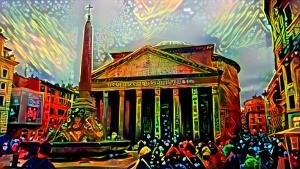
Dawkins, who reveres science like we all do, raises a hypothesis to be evaluated according to rational evidence. He thinks that God is one thing among other things, kinda like Sasquatch or a law of nature. Because the evidence falls short of proving such a god exists, Dawkins concludes that we should answer negatively to the question, “does God exist?”
Then Dawkins supplies his alternative hypothesis that the idea of God or the gods is the product of the natural process of evolution.
Dawkins’ arrow misses the theological target. At least according to Patheos columnist Frederick Schmidt.
“We need to be clear that the question of God can’t be answered in scientific terms. We cannot prove that God exists and – likewise – we cannot prove that God doesn’t exist.”
Atheism and the Laws of Nature
Many of today’s atheists conflate the assumptions of science with their materialist worldview. If God does not fit within the laws of nature, they argue, then God does not exist. Patheos columnist Vance Morgan loses his patience with this argument. Today’s atheists, says Morgan…

“…will only accept a specific type of evidence—that which can be verified within the parameters of the laws of nature. The theist makes a serious mistake when she or he agrees to play the ‘does God exist?’ game by these rules. In truth, [an atheist] belief that ‘everything is the product of mindless natural laws acting on mindless matter’ is as much an act of faith as the theist’s belief that there is at least one being—God—that transcends those laws.”
The assignment such atheists do not understand is how your and my religious sensibilities interact with the divine. How do we interact with God understood as both the Beyond and the Intimate?
God is that than which nothing greater can be conceived.
The website 412 Teens.Org tells us…
“no one can prove the existence of God, but no one can disprove it either. It’s all a matter of faith.”
Really?[1] Sounds like an IYKYK put-off. So, let’s not jump to this off-putting conclusion too hastily. Faith could still benefit from expanded and deepened understanding.
Recall what I mentioned above: God can be God to us only if God is the Beyond. God is the beyond for which there is no further beyond.
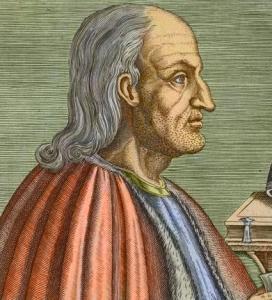
Have you ever heard of Saint Anselm? Anselm served as Archbishop of Canterbury in England from 1093 to 1109 AD. Anselm defined God as “That than which nothing greater can be conceived.” If you can conceive of something greater than God, then that’s not the true God. This was Anselm’s logic. It’s Anselm’s way of saying there is nothing beyond God.
At this point, Anselm made a curious yet powerful argument. God, understood as that than which nothing greater can be conceived, must necessarily exist. What? Really?
In his book published in the year 1078, The Proslogion, Anselm asks: does God exist? Yes, he answers. God necessarily exists because conceiving of God as real is greater than conceiving of God as not existing. Didja get that? If not, try reading Anselm’s own words.
God cannot be conceived not to exist.—God is that, than which nothing greater can be conceived.—That which can be conceived not to exist is not God.
AND it assuredly exists so truly, that it cannot be conceived not to exist. For, it is possible to conceive of a being which cannot be conceived not to exist. And this is greater than one which can be conceived not to exist. Hence, if that, than which nothing greater can be conceived, can be conceived not to exist, it is not that, than which nothing greater can be conceived. But this is an irreconcilable contradiction. There is, then, so truly a being than which nothing greater can be conceived to exist, that it cannot even be conceived not to exist; and this being thou art, O Lord, our God.
How do you like this? Does this argument hit different? Even if it’s not the GOAT (greatest idea of all time)?
Philosophers have called this the ontological argument for the existence of God. Whether this counts as definitive proof or faith seeking understanding, Anselm gets one thing right: God is Beyond.
As you notice, Anselm is not talking about Zeus, Ganesha, or the earth-mother goddess, let alone Sasquatch. God, for Anselm is not one being among others. God is the ground and source of the existence of everything that exists. Because God is the source of everything that exists, God in Godself is beyond existing.[2]
From Theism to Trinitarian Theism
Theists among your friends are those who answer the question—does God exist?—affirmatively. You can find lots of theists in the Jewish, Christian, and Islamic traditions.
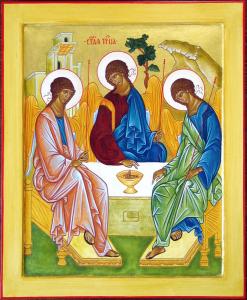
When it comes to trinitarian theism, the symbolism gets a good deal more complicated. More complicated yet more precise.
God the Father symbolizes the Beyond. This is God in the way we’ve been talking about, namely, the eternal and infinite source of all being.
God the Son symbolizes the divine in finite form, located in one time and one space. Jesus of Nazareth existed in time and space.
God the Holy Spirit symbolizes God as Intimate. The Holy Spirit enters you at the deepest level and helps to construct your soul. On the one hand, your soul is distinctively you. On the other hand, the Holy Spirit makes you a child of God from within. The Holy Spirit seals the deal, so to speak, by placing the oneness of our magnificent cosmos right within your essential self. The Beyond and the Intimate meet within you.
Again: does God exist?
The question — does God exist? — is an existential question. It has to do with your and my existence. Patheos columnist Richard Simmons feels the gravity of such a question.
“If there is no God, we are here by chance. We are nothing but a mass of molecules. A human life has no real value for we are nothing but a product of nature. Since we are just physical beings, we have no souls or any spiritual dimension to our lives. We are meaningless beings in this random universe.”
Conclusion
As I suggested earlier, when we ask—“does God exist?”—we are also asking whether your or my life really matters. To ask—“does God exist?”—is to ask whether your or my life has ultimate meaning.
On the one hand, our word God refers to the creator and redeemer of the cosmos, of all that is or ever will be. On the other hand, the same word, God, refers to what lies deepest within us. The Beyond and the Intimate meet within your or my soul.
PT 3607 Asking Google Existential Questions: Does God exist?
Patheos PT 3603 Asking Google Existential Questions
Patheos PT 3604 Why am I lost in depression?
Patheos PT 3605 What happens after we die?
Patheos PT 3606 Will I ever find my true soulmate?
Patheos PT 3607 Does God exist?
▓
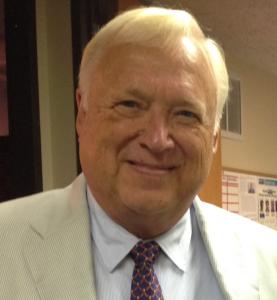
For Patheos, Ted Peters posts articles and notices in the field of Public Theology. He is a Lutheran pastor and emeritus professor at the Graduate Theological Union. He co-edits the journal, Theology and Science, with Robert John Russell on behalf of the Center for Theology and the Natural Sciences, in Berkeley, California, USA. His single volume systematic theology, God—The World’s Future, is now in the 3rd edition. He has also authored God as Trinity plus Sin: Radical Evil in Soul and Society as well as Sin Boldly: Justifying Faith for Fragile and Broken Souls. See his website: TedsTimelyTake.com.
Watch for his new 2023 book, The Voice of Public Theology, published by ATF Press.
▓
[1] Here is another proof for the existence of God. This is offered online by Student Devos. It’s not an ontological proof. Rather’s it’s a cosmological proof. You don’t need to know the difference. Just read this and see if it hits different.
If you’re like many teenagers, you probably have a gaming system in your house. The XBox or Playstation at your home is complex and has lots of small complicated parts that make it work. It has controllers, a hard drive, and tons of wiring. All those complicated pieces have to function together to make the game work properly. All the parts that go into making the game are to complex to just have “happened” one day. Your XBOX didn’t just show up in your living room. It had to be put together…it had to be created. The complexity of the game system shows that it had to have a creator.
In the same way our world is complex. The trees, the oceans, animals and people that make it up are way too complex to just have “happened”.
We can see that there was evidence of a creator in the world around us, but it is up to us to choose to believe that creator was God.
[2] In one sense, “does God exist?” is an oblique question. It misleads us. Why? To exist from the Greek, ek-stasis, means to stand out of nonbeing. Everything we know that exists stands in one time and one place. This does not describe an eternal and infinite God. So, it’s a bit more precise to say that God is the ground or source of all being. God makes existence possible, even if God in Godself does not exist like other things.




